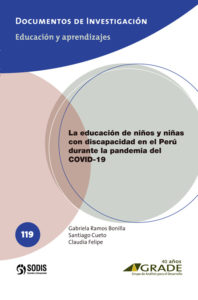La educación de niños y niñas con discapacidad en el Perú durante la pandemia del COVID-19
| Year | : | 2021 |
|---|---|---|
| Author/s | : | Gabriela Ramos Bonilla, Santiago Cueto, |
| Area/s | : | Education and learning |
Ramos, G., Cueto, S. & Felipe, C. (2021). La educación de niños y niñas con discapacidad en el Perú durante la pandemia del Covid-19 [Documento de Investigación, 119]. Lima: GRADE; Sodis.
This research used a mixed methodology in order to analyze how the Covid-19 health emergency has changed the way in which inclusive educational services are offered in the public sector, and the ability to exercise the right to education of students with disabilities at the primary level in the modalities of Special Basic Education (EBE) and Regular Basic Education (EBR), called inclusive schools. To this end, from the quantitative component, using the National Household Survey (Enaho), it was found that more students between 6 and 13 years of age reported attending school in 2020, compared to 2019. However, the qualitative study found that this access was in many cases precarious. Thus, the measures established by the Minedu to guarantee the presence of the service, the effective participation of students with special educational needs associated with disability and the evaluation of their learning achievements were analyzed. A comparison was made of what these documents established with the way they were implemented locally in two regions of the country and the limitations that this strategy demonstrated. Finally, the numerous self-managed strategies implemented by actors of the educational community to respond to intervention gaps and local problems were reported, which demonstrates the agency and determination of these actors, as well as the shortcomings and limitations of the Aprendo en Casa strategy.







